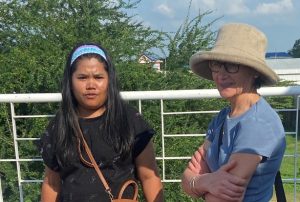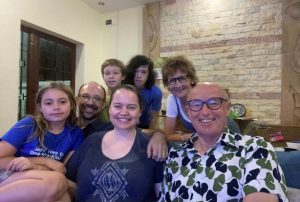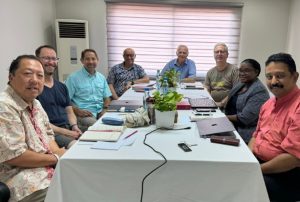Never before have all the CMS Chairpersons met in person from around the globe. For the past four years, CMS Chairpersons have met twice yearly via Zoom to build a sense of global fraternity, hear about each other’s plans, and learn from one another for the good of the mission worldwide. Last year it was decided that all the Chairs should meet in person to further foster this CMS global family. This inaugural meeting took place recently in Cambodia, where the CMS Asia staff had been meeting for their annual gathering and strategy planning sessions.
All seven CMS Chairs attended this forum, comprising of Australia, Asia, Africa, UK, Ireland, America (SAMS/CMS) and NZ. The Chairs spent time listening to one another’s approaches to mission, theology and strategic planning, along with meeting the Asia CMS management who cover Indonesia, Malaysia, Vietnam, India, Pakistan, Sri Lanka and Nepal. There was also a day spent visiting some of their CMS Asia mission projects comprising of an orphanage, church, and school and meeting families from a remote village. From this gathering I have summarised a few of the interesting aspects of the chair’s discussions for your interest.
The first two days involved learning and experiencing the culture and region of Cambodia. It was sobering to hear about the communist genocide of the 1970’s where 2–3 million Cambodian people (especially educated people) were executed. Generations later that impact is still being felt as the country continues to slowly start its economic development again. The implications of having 65% of the population under 30 years old is seen in the young workforce and leadership roles these young people have to step into. At a school project we visited I met a 30-year-old charming and cheerful girl who I thought was an enthusiastic young teacher at the school, but no! She was the Principal! She had been raised as an orphan with the loss of her parents during the genocide.
As an aside, after the CMS Chairs met, we returned to Cambodia and visited Phnom Penh to visit the Dunbar family. We had a wonderful evening with them in their home. The three children are at Hope International Christian School, Neill is teaching English to students 2 days a week and serving the rest of his week at their local church plant and Rebekah is running a women’s Bible study group and continuing with a private tutor to further her language skills. The hour-long trek back into the city in a Tuk-tuk in monsoon rain was a great adventure on a bustling Friday evening!
Back to our gathering with the CMS Chairs. We met and shared about our Board structures, governance practices, theological positions, funding models, strategic goals and challenges we face. Overall, it became apparent that all the CMS globally had many similar setups, theology positions, mission focus and global challenges. Board structures were all legal entities, with board numbers ranging from 9–25 members with the average being 10–12 members. Governance policies focused on ‘Safeguarding’ policies. Policies for Mission Partners care and well-being and safeguarding protocols in their daily deployment, for staff and volunteers, and the marginal people groups of young children, youth, disabled, illiterate, elderly, and village people.
Theological discussions around CMS Statements of Belief were discussed at length. Interestingly all CMS had taken a ‘conservative, evangelical, orthodox theology’ position linking it to the authority of the scriptures and the Lausanne Conference declaration previously announced on these issues.
Funding models to support future strategies and compensate for traditional funding from churches were interesting. However, it was observed that church funding was increasingly targeting individuals and/or projects more than just the mission organisation. A marketing-fundraising person for one CMS branch had identified 9 subgroups of their supporters and designed a promotional campaign specifically for each of these subgroups.
Strategically CMS globally is assessing the traditional model of sending Mission Partners vs expanding ‘co-partnership or ‘indigenous Mission Partner’ arrangements. To enter most countries now Mission Partners will need specific qualifications that will benefit that country. However, Cambodia remains open for direct gospel ministry.
A phrase used was ‘Majoriatalism’. This was where the dominant religion(s) of a country (especially Asia-wide) start to exert political influence to suppress the impact of minor religions within their country. This means Christians wanting to bring the Gospel to these countries are likely to have their visa refused due to the pressures placed on Governments by the major religion of that country.
To further foster partnership relationships between CMS’s another phrase used was ‘Community’.
CMS Boards — through their CEO’s/National Directors — should be ensuring that the host countries that we are sending Mission Partners to have good relationships with the CMS of that region. It was noted that CMS CEO’s/National Directors are now in regular contact with each other and this has been very advantageous for working in increasing collaborative partnerships.
In summary, establishing the inaugural global CMS Chairperson’s ‘in-person’ gathering was uplifting and inspiring. CMS agencies globally have many things in common, from their theological basis to the desire to bring the Gospel to ‘the edges/the harder places’ as a priority for their work.
There has been a growing collegial approach by CMS management staff globally and this is leading to increased co-partnership arrangements developing. I believe CMS is actually growing in universal strength for the glory of God. CMS globally is building significant momentum and Mission Partners, staff, volunteers and supporters should be very encouraged by these developments.
Graeme Mitchell
NZCMS Chair




Thanks Graeme.
Sounds like a worthwhile initiative.
FY future info, its either “comprises” or “is composed of.” :-)